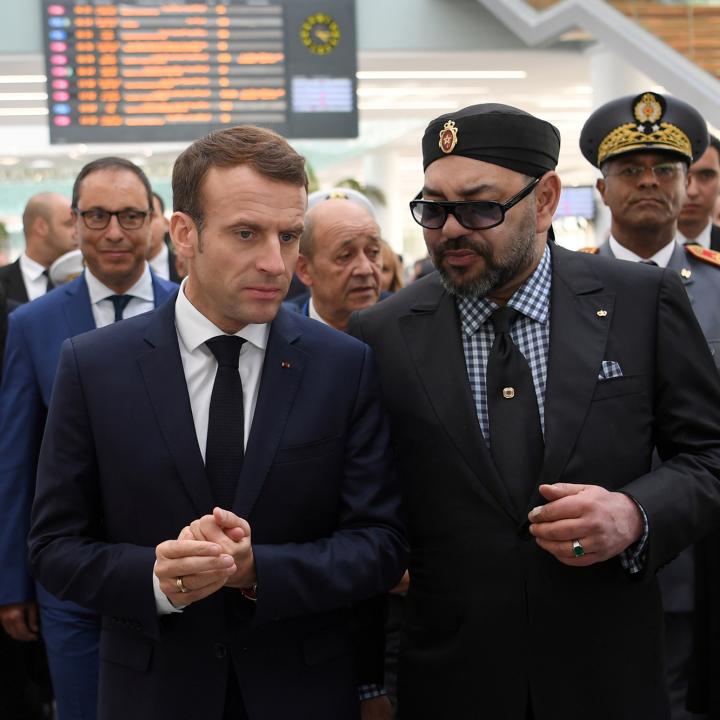
- Policy Analysis
- Fikra Forum
France’s Balancing Act: Mending Relations and Ending Moroccan Visa Restrictions

A recently announced visa decision and a presidential visit to Rabat indicate France’s eagerness to regain its diplomatic position in the region.
After more than a year of tension between France and Morocco over migrant issues, French foreign minister Catherine Colonna announced an end to restrictions on Moroccan visas during her mid-December visit to Rabat. Beyond addressing Moroccans’ publicized discontent with the visa cutbacks, the decision reflects France’s growing effort to rebalance relations with its North African partners. Such an effort is more essential now than ever before, as spats across the Maghreb threaten to ramp up.
French-Moroccan Relations Hit a Rough Patch
Although France’s relationship with Morocco during President Emmanuel Macron’s administration appeared to start off on the right foot—especially after the success of Macron’s first “friendship visit” to the kingdom in 2017—dialogue between the two countries had reached an impasse by 2020. At the center of the disagreement lay the perennial issue of migration from North Africa, with France pushing countries in the region to implement stricter measures to manage the outflow of migrants, which averages at about 100,000 arrivals per year. Frustrated with the lack of cooperation from Morocco, Tunisia, and Algeria in readmitting nationals who had been denied visas after migration, France ultimately reduced the number of visas it issued to their citizens in September 2021.
This unprecedented move was particularly ill-received in Algeria and Morocco, where visas were cut by half. Moroccan foreign minister Nasser Bourita described the decision as “unjustified” and failing to “reflect the reality of consular cooperation in the fight against irregular migration.” The drastic cut also had a major impact on Moroccan citizens—an estimated 98,627 Schengen visas had successfully been issued to Moroccans in the year prior. With more than 700,000 people of Moroccan origin living in France, fewer visas meant greater difficulty visiting family members, studying abroad, accessing medical care, or seeking job opportunities for tens of thousands of Moroccans.
Over the following year, relations cooled further. Although official statements from both governments refrained from addressing the tensions directly, the unease was visible in France’s apparent hesitation to appoint a new ambassador to Morocco after the departure of Helene Le Gal in September 2022. One month later, Morocco responded by recalling Ambassador Mohamed Benchaaboun from Paris just weeks after his appointment. Investigations throughout 2020 and 2021 into Morocco’s alleged spying on French officials during the Pegasus spyware scandal only made matters worse.
France’s Reassessment and Moroccan Balancing
Colonna’s announcement in December marked an important step toward mending a relationship that had been on the decline. The first signal at an attempted rapprochement with the Maghreb came earlier in August, when Macron visited Algeria for the first time since making controversial remarks criticizing Algiers the previous year. During the visit, he expressed France’s desire for a “renewed partnership” with Algeria and discussed France’s continued role in regional developments. Soon after ending visa restrictions for Moroccans, French interior minister Gerald Darmanin announced the Algerian visa cut would also end.
These efforts at a return to direct diplomacy are slated to continue; Macron will reportedly be visiting Morocco in early 2023 for the first time in nearly five years. In the meantime, normal consular relations between the two countries have been restored. France has already appointed a new ambassador in Rabat, setting the diplomatic stage for further rapprochement.
While Morocco and Algeria may have capitulated somewhat on the migrant issue by cooperating with France’s readmission orders, this apparent attempt to reverse course and eagerly smooth things over likely reflects France’s concerns over a growing spat between these two North African countries.
Some observers fear a potential “arms race” between Algeria—Africa’s largest defense spender—and its rival Morocco as relations continue to worsen over the perennial tension point of Western Sahara. Rabat may be expecting firmer language from France in support of Morocco’s “autonomy plan” in Western Sahara, but France’s balanced approach in recent months seems designed to put the country back in a position to advocate for sustainable solutions to the conflict through international legal channels.
France remains comfortable voicing an opinion similar to European neighbors such as Spain—calling the autonomy plan “a basis on which serious and credible talks can be built” while not going as far as the United States—but its attempts to mend ties on both sides highlight the delicate balance France must maintain to do so. Meanwhile, Morocco is performing a balancing act of its own. With the Western Sahara conflict at the cornerstone of its foreign policy, Rabat has increasingly looked toward diverse economic and political international partners to develop more stable relations and garner support for the autonomy plan.
Such interlocking concerns highlight the ways in which bilateral issues—such as the question of migrant visas—overlap with regional and global ones. France’s balancing act becomes ever trickier as global conditions shift. And as its North African neighbors find new strategies to pursue their goals, challenges will persist beyond the immediate positive press expected from Macron’s upcoming visit.




